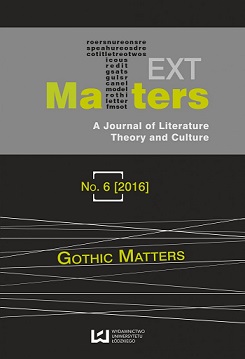Gothic Trouble: Cormac McCarthy’s The Road and the Globalized Order
DOI:
https://doi.org/10.1515/texmat-2016-0009Abstract
The article explores the way American author Cormac McCarthy uses the Gothic genre in his novel The Road as a means to address what has been called “our globalized order,” in particular the way it has turned human beings into consuming or consumed entities. Some dimensions of this globalized order indeed involve the reintroduction of slavery through human trafficking, unprecedented greed and labor capitalism, surveillance and personal data gathering. Hannah Arendt notes in The Origin of Totalitarianism that the disasters of the twentieth century had proved that a globalized order might “produce barbarians from its own midst by forcing millions of people into conditions which, despite all appearances, are the conditions of savages.” The artist’s task is to find the right language and images to address the breaking of the world. French philosopher J. P. Dupuy, for example, has argued that the financial world is a way to contain (contenir) the violence of competition, placing it into acceptable (symbolic) forms away from primal physical competition. McCarthy’s graphic use of Gothic tropes—including cannibalism, the wild forest, the haunted house, the chase, the conflict between light and darkness, the blurring of boundaries between different categories—creates a shock. The article also addresses the larger question of the impact of globalization on Gothic literature, and the impact of Gothic literature on real world matters as it contributes to and reflects upon and challenges global regimes of economic, social and economic power. In other words, what is the cultural work that the Gothic does in the present?
Downloads
References
Baker, Simon, and Shoair Mavlian, eds. Conflict.Time.Photography. London: Tate Enterprises, 2014. Print.
Google Scholar
Bromwich, David. “Stay Out of Syria.” New York Review of Books 20 June–10 July 2013: 4–6. Print.
Google Scholar
Cartwright, Keith. Reading Africa into American Literature: Epics, Fables, and Gothic Tales. Lexington: U of Kentucky P, 2002. Print.
Google Scholar
Cole, David. “Must Counterterrorism Cancel Democracy?” New York Review of Books 8 Jan.–5 Feb. 2015: 26–28. Print.
Google Scholar
Evenson, Brian. “McCarthy and the Uses of Philosophy in the Tennessee Novels.” The Cambridge Companion to Cormac McCarthy. Ed. Steven Frye. Cambridge: CUP, 2013. 54–64. Print.
Google Scholar
Frye, Steven. Understanding Cormac McCarthy. Columbia: U of South Carolina P, 2009. Print.
Google Scholar
Gray, Richard. A Web of Words: The Great Dialogue of Southern Literature. Athens: U of Georgia P, 2007. Print.
Google Scholar
Josephs, Allen. “What’s at the End of The Road?” South Atlantic Review 74.3 (2009): 20–30. Print.
Google Scholar
King, Stephen. Danse Macabre. New York: Gallery, 2010. Print.
Google Scholar
Kollin, Susan. “‘Barren, silent, godless’: Ecodisaster and the Post-Abundant Landscape in The Road.” Cormac McCarthy: All the Pretty Horses, No Country for Old Men, The Road. Ed. Sara Spurgeon. New York: Continuum, 2011. 157–71. Print.
Google Scholar
Lasida, Elena, and Patrick Viveret. “L’économie au service de la vie bonne.” Etudes 4212 (2015): 19–30. Print.
Google Scholar
McKibben, Bill. “Collapse and Crash.” New York Review of Books 20 June–10 July 2013: 53–54. Print.
Google Scholar
McCarthy, Cormac. No Country for Old Men. New York: Vintage International, 2005. Print.
Google Scholar
McCarthy, Cormac. The Road. New York: Vintage International, 2006. Print.
Google Scholar
Miller, Arthur. Death of a Salesman. New York: Penguin, 1976. Print.
Google Scholar
O’Brien, Geoffrey. “Two Eerie Experiences in New York.” New York Review of Books 8 Jan.–5 Feb. 2015: 28–30. Print.
Google Scholar
O’Connor, Flannery. “The Fiction Writer and His Country.” Mystery and Manners: Occasional Prose. Ed. Sally and Robert Fitzgerald. New York: Farrar, 1969. 25–35. Print.
Google Scholar
Rivera, Lysa. “Future Histories and Cyborg Labor: Reading Borderlands Science Fiction after NAFTA.” Science Fiction Studies 39.118 (2012): 415–36. Print.
Google Scholar
Schaub, Thomas H. “Secular Scripture and Cormac McCarthy’s The Road.” Renascence: Essays on Values in Literature 61.3 (2009): 153–67. Print.
Google Scholar
Shaw, Tamsin. “Nietzsche: ‘The Lightning Fire.’” Rev. of The Flame of Eternity: An Interpretation of Nietzsche’s Thought, by Krzysztof Michalski. New York Review of Books 24 Oct.–6 Nov. 2013: 52–56. Print.
Google Scholar
Trotignon, Béatrice. “The Persistent Relic of Prayer in The Road by Cormac McCarthy.” Revue Française d’Etudes Américaines 141 (2014): 197–209. Print.
Google Scholar
Downloads
Published
How to Cite
Issue
Section
License

This work is licensed under a Creative Commons Attribution-NonCommercial-NoDerivatives 4.0 International License.













